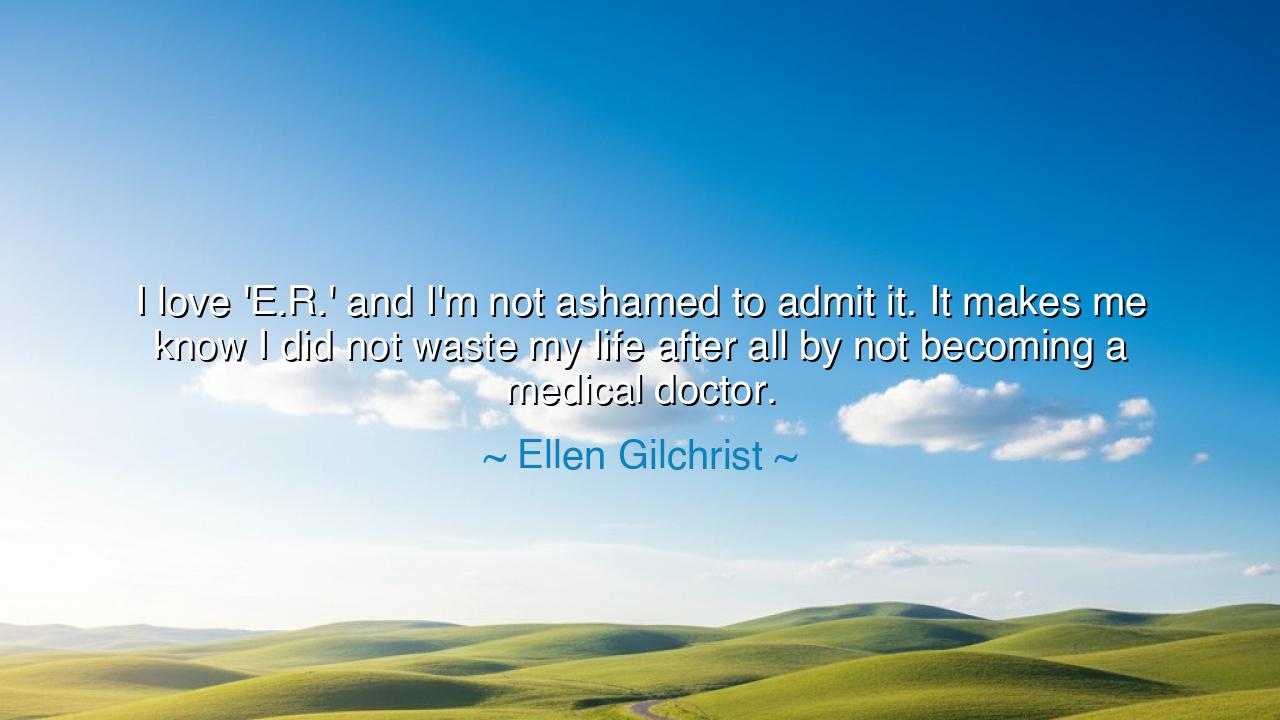
I love 'E.R.' and I'm not ashamed to admit it. It makes me know I
I love 'E.R.' and I'm not ashamed to admit it. It makes me know I did not waste my life after all by not becoming a medical doctor.






Hear, O children of reflection, the words of Ellen Gilchrist, who declared with honesty and mirth: “I love E.R. and I’m not ashamed to admit it. It makes me know I did not waste my life after all by not becoming a medical doctor.” In this simple yet profound confession lies the eternal struggle of humankind: the questioning of paths not taken, the wondering of what might have been, and the reconciliation of heart with destiny. For her words are not only about a television show, but about the longing to know that one’s life still carries meaning even when certain dreams are left behind.
The meaning of her words shines like a torch in the dark corridors of doubt. Many stand at crossroads and wonder: “Should I have chosen differently? Should I have followed that noble calling, that profession of healing, that life of service?” Gilchrist reminds us that though she did not become a medical doctor, her life was not wasted. In embracing her love for stories, for art, and for the reflections of human struggle seen in shows like E.R., she sees her own worth affirmed. The heart yearns for reassurance that the path chosen is still valid, that the unlived life does not diminish the life actually lived.
Consider, O hearers, the tale of Anton Chekhov, the Russian master of the short story. He was both physician and writer, tending the sick while penning tales that revealed the soul of humanity. Yet when asked which identity defined him, he said, “Medicine is my lawful wife, and literature is my mistress.” In truth, though he walked both paths, his words suggest that no single life can contain all possibilities. Some must choose one way over another. Yet, like Chekhov, Gilchrist reminds us that every path chosen can carry value—that even if one does not become a doctor, one can still heal through words, through laughter, through art.
The origin of her reflection rests in the tension between admiration and regret. She admires the work of doctors, those who save lives in hospitals and emergency rooms. Watching E.R. stirs the yearning of what might have been had she donned the white coat herself. Yet instead of sinking into sorrow, she finds joy—joy in the recognition that the stories of medicine still touch her, that her own life still carries weight, that her contributions as a writer are no less meaningful. Her statement is both confession and victory: she has reconciled the path not taken with the life she embraced.
Let us not mistake her words as trivial. To love a story about doctors is not merely entertainment—it is an act of connection. For in those tales of crisis, compassion, and courage, she sees reflected the nobility of service and the fragility of life. By embracing them, she partakes in the meaning of medicine without having studied it. Thus her heart finds peace: though she is not a doctor, she has not wasted her life, for she too has offered healing—healing through stories, insight, and the written word.
The lesson for us is clear: do not despise the road you have chosen merely because another seemed noble. Every life has value when lived with purpose. Not all can be doctors, or soldiers, or rulers; yet each person can serve in their own calling. Some heal with medicine, others with words, others with song or labor. What matters is not that you chose one calling over another, but that you embraced your chosen calling with devotion.
Practical actions lie before you: if you find yourself haunted by the life you did not live, seek ways to honor that dream in the life you do live. If you longed to heal, then comfort the suffering around you. If you wished to teach, then share your wisdom with the young. If you desired to create, then let your hands shape what beauty you can. And when you admire others—the doctors, the builders, the artists—let their greatness inspire you, not shame you. For no life is wasted that is lived with purpose and love.
Thus, O heirs of tomorrow, let Gilchrist’s words remind you: though you cannot live all lives, the life you live is enough if it is embraced with joy. Do not dwell on what you are not; rejoice in what you are. For the world is not saved by doctors alone, but by writers, dreamers, and creators too. Your life is not wasted, so long as it is lived with meaning.






AAdministratorAdministrator
Welcome, honored guests. Please leave a comment, we will respond soon